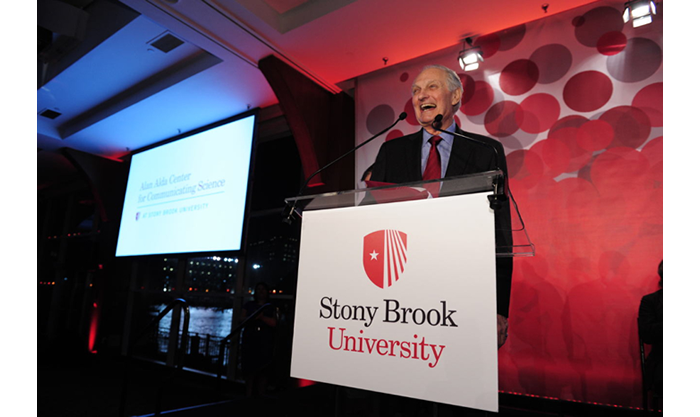In spring 2013, the Alan Alda Center for Communicating Science at Stony Brook University began a pilot program to develop the communication skills of graduate Teaching Assistants in an introductory Biology laboratory course. The goal was to improve undergraduates’ experience in this gateway course, with the long-term goal of bolstering retention of students in the STEM disciplines.
In series of weekly workshops, Alda Center instructors worked with seven TAs, primarily using techniques based on improvisational theater exercises. This approach, which the Center has developed since 2009 in Improvisation for Scientists courses at Stony Brook and in workshops around the country, is very different from the entertainment-based improv with which many people are familiar. Instead, it emphasizes paying close, dynamic attention to the people with whom you are communicating, reading and responding to their spoken and unspoken cues, making a personal, human connection, and using storytelling techniques, where appropriate. A discussion board was established on which the TA’s shared the results of communication assignments they were asked to carry out in their lab sessions.

At the end of the semester, this group of Improv TA’s received higher student evaluations than a control group of seven other TAs in the same course. The Improv TA’s, who were all first-time teachers, were rated at similar levels as experienced adjunct instructors. The Improv TAs’ students also performed better on an end-of-semester lab competency exam than did the control TAs’ students. Qualitative feedback from course faculty members and from the Improv TA’s was highly favorable. Among other things, the TAs reported that students were more likely to come to them with questions, to ask their advice, and to thank them for their help, after the TAs had made a human connection by telling a story drawn from their own experience.
Based on this pilot project, the number of Biology TA’s in the program was doubled in fall 2013, and pilot programs were begun in Physics and Chemistry introductory lab courses, using similar techniques but different formats. The programs in Biology and Chemistry are continuing in spring 2014. The data from fall is being analyzed, and the Center and its science faculty partners continue to assess the work, seeking ways to improve it. In addition, a workshop was held Feb. 21, 2014 for the leaders of STEM programs at Stony Brook to increase knowledge of the Alda Center’s techniques and of this project.
This work has received support from Stony Brook’s Office of the Provost, Undergraduate Biology, Chemistry and Physics departments, School of Journalism (home of the Alda Center) and from the Center for Science and Mathematics Education (CESAME). Funding for graduate students to collect and analyze data was provided through an existing Howard Hughes Medical Institute grant to CESAME.